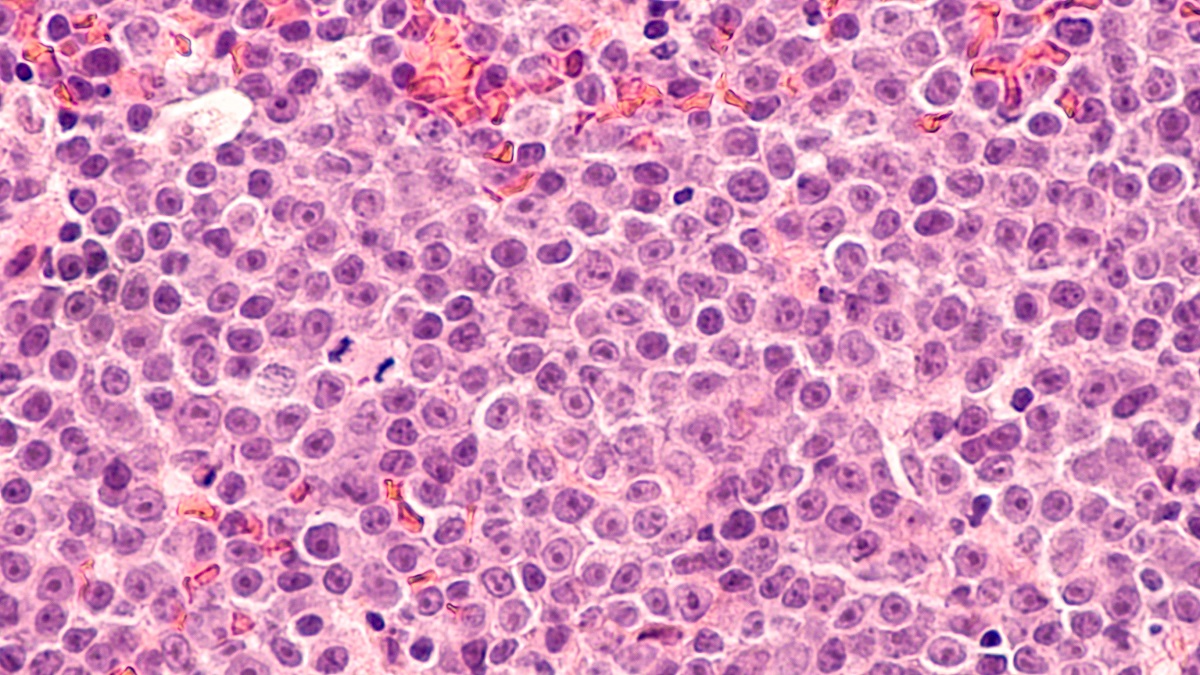KEY TAKEAWAYS
- The study aimed to investigate PDK4’s role in rituximab resistance and explore exosome nanoparticles for new DLBCL treatment targets.
- Researchers noted that PDK4 alters CD20 via HDAC8 in rituximab-resistant DLBCL; offering promising treatment prospects.
Diffuse large B-cell lymphoma (DLBCL) represents a prominent subtype of malignant tumor, with 40% of patients (pts) reporting treatment challenges or relapse due to rituximab resistance, primarily because of the diminished CD20 expression.
A prior study identified PDK4 as a critical regulator of rituximab resistance through its negative expression control of CD20. Further investigation into PDK4’s resistance mechanism and the development of advanced exosome nanoparticle complexes may unveil novel resistance targets and pave the way for innovative and effective treatment modalities for DLBCL.
Xin Wu and the team aimed to investigate the mechanism of rituximab resistance in DLBCL, with a specific emphasis on the role of PDK4 in downregulating CD20 expression.
They employed a DLBCL-resistant cell line with high PDK4 expression (SU-DHL-2/R), and infected it with short hairpin RNA (shRNA) lentivirus for RNA sequencing, targeting to identify significantly downregulated mRNA in resistant cells.
Methods like immunofluorescence, immunohistochemistry, and western blotting were used to determine PDK4’s localization and expression in resistant cells and its regulatory role in the phosphorylation of histone deacetylase 8 (HDAC8).
Furthermore, they engineered advanced exosome nanoparticle complexes, aCD20@ExoCTX/siPDK4, through cellular, genetic, and chemical engineering methods. These nanoparticles were then characterized via dynamic light scattering (DLS) and transmission electron microscopy (TEM), and their cellular uptake was assessed through flow cytometry.
The effects of the nanoparticles on apoptosis in DLBCL-resistant cells and immune cells were evaluated using CCK-8 assays and flow cytometry. Additionally, their capacity to counteract resistance and exert anti-tumor effects was tested in resistant DLBCL subjects.
The effects of the nanoparticles on apoptosis in DLBCL-resistant cells and immune cells were evaluated using CCK-8 assays and flow cytometry. Additionally, their capacity to counteract resistance and exert anti-tumor effects was tested in resistant DLBCL subjects.
Results revealed that PDK4 triggers HDAC8 activation by phosphorylating the Ser-39 site, suppressing CD20 protein expression via deacetylation, and consequently developed a novel approach using aCD20@ExoCTX/siPDK4 nanoparticles.
These nanoparticles effectively delivered gene therapy and monoclonal antibodies intracellularly, demonstrating dual action by inducing apoptosis in resistant DLBCL cells and promoting immunogenic cell death in tumor cells. This dual mechanism successfully reversed the immunosuppressive tumor microenvironment, highlighting a synergistic therapeutic effect.
Also, these showcased significant efficacy in experimental subjects using subcutaneous tumors resistant to treatment. These nanoparticles effectively targeted and treated the resistant DLBCL cells, showcasing their potential as a promising therapeutic strategy for overcoming rituximab resistance in DLBCL.
The study concluded that PDK4 contributed to rituximab resistance in DLBCL by altering CD20 expression via HDAC8 phosphorylation. The designed nanoparticles effectively overcame the resistance by targeting the PDK4/HDAC8/CD20 pathway, offering a promising approach for drug delivery and treating pts with rituximab-resistant DLBCL.
The study was funded by the National Natural Science Foundation of China.
Source: https://pubmed.ncbi.nlm.nih.gov/39004737/
Wu X, Ban C, Deng W, et al. (2024). “Unveiling the PDK4-centered rituximab-resistant mechanism in DLBCL: the potential of the “Smart” exosome nanoparticle therapy.” Mol Cancer. 2024 Jul 15;23(1):144. doi: 10.1186/s12943-024-02057-0. PMID: 39004737.



